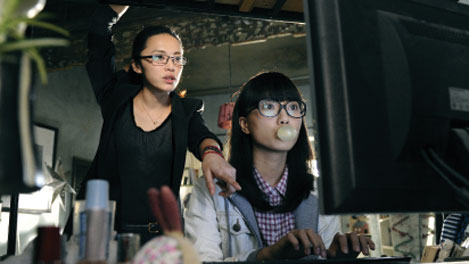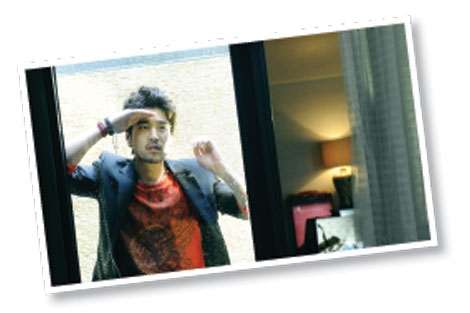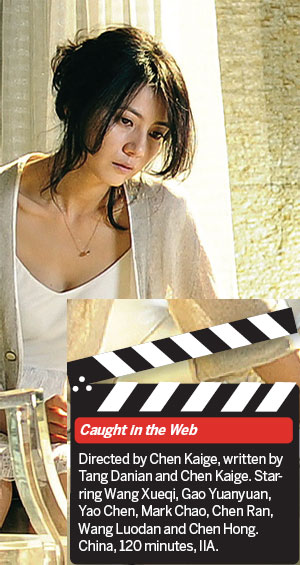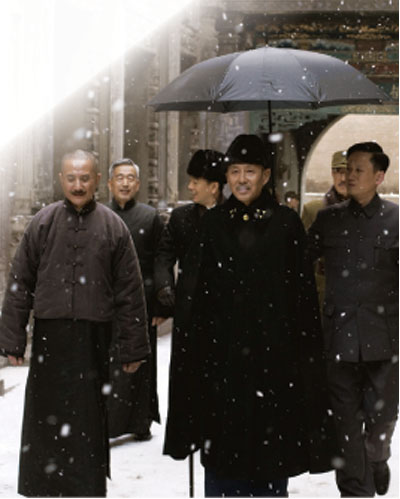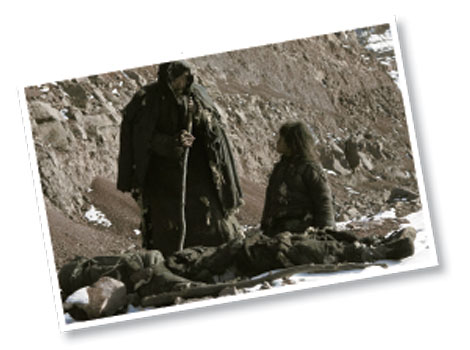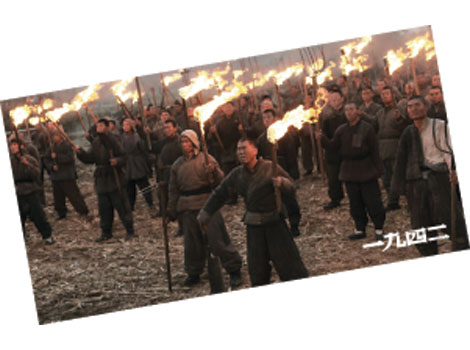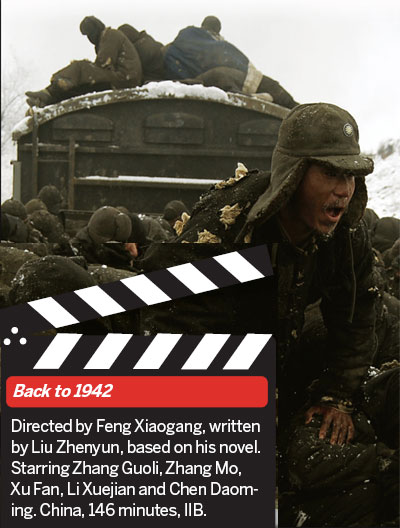Role reversal
Updated: 2012-12-08 05:52
By Elizabeth Kerr(HK Edition)
|
|||||||||
|
A furious Ruoxi (Yao Chen) gets Jiaqi (Wang Luodan) to help carry forward an Internet smear campaign in the appropriately titled Caught in the Web. |
|
Yang Shoucheng (Mark Chao) tries to be the good guy in an ugly drama. Caught it the Web. |
|
Modern China is all about seizing opportunity for Tang Xiaohua (Chen Ran) who finds an unlikely ally in Mrs Shen (Chen Hong). |
|
Ye Lanqiu (Gao Yuanyuan) suffers a disproportionate sentence for a momentary lapse into selfish emotionalism in the latest contemporary work from Chen Kaige. |
Chinese directors Chen Kaige, Feng Xiaogang step out of their comfort zones. Elizabeth Kerr reports.
It would seem that fifth generation master Chen Kaige (Farewell My Concubine, the execrable The Promise) has swapped places with arguable sixth generation director Feng Xiaogang (Aftershock). While each has dabbled in both period and contemporary drama, Chen is widely regarded as a master of the historical epic, having only ever made two modern films - Together and the baffling Killing Me Softly. Feng, on the other hand, had rooted the majority of his films in the here and now, as any good sixth generation filmmaker would, taking a breather for The Banquet and, perhaps, Assembly. So when the time comes to recreate one of the bleakest years in China's recent past you'd think the first choice to do it would be Chen. Similarly, if a film were looking to make a piquant comment on the uninformed, web-based character assassination that is so au courant, the logical thinking would be to call upon Feng. Well, sometimes the exception proves the rule. And it would seem the master is the master for a reason.
In the $35 million Back to 1942 Feng reconstructs the Henan famine that broke out at the same time the Chinese army was battling Imperial Japan on several fronts. When the province's food supply all but vanishes due to floods or droughts or dust or whatever the official excuse was being handed to the people, and what little available is diverted to the army, a great migration west to Shaanxi begins. Believing it a temporary measure, the wealthy Fan Dianyuan (Zhang Guoli) packs up his family and sets out with the rest of his town. Though he's unwilling to admit it, he quickly learns that he's simply another refugee, along with his dedicated right hand, Shuanzhu (Zhang Mo), and a tenant, Huazhi (Xu Fan) and their families. As the rapidly dwindling numbers plod along the dry, cold roads, Chiang Kaishek (Chen Daoming, Hero) wages a war with the few resources he has, despite pleas from provincial governor Li Peiji (Li Xuejian) for famine relief.
Conversely, Chen's wholly modern Caught in the Web's warm, soft-edged images belie its jagged critique. Set within the gleaming, media-saturated Beijing middle class, the story starts with a seemingly throwaway moment on a public bus that steamrolls into a major national talking point - as so many moments like it are wont to do these days. The luminous Ye Lanqiu (Gao Yuanyuan, Beijing Bicycle) drifts into her own little world on her way to work after being diagnosed with a fatal illness. Zoned out and fretting over her health, she refuses to give up her seat to an elderly man. Ambitious web "reporter" Jiaqi (Wang Luodan) captures it all on her phone, and her even more ambitious editor Ruoxi (Yao Chen, who could be Shu Qi's long lost sister) makes it a viral sensation. Before you can say "YouTube" the incident has driven Lanqiu into a protected exile with Ruoxi's photographer boyfriend Yang Shoucheng (Mark Chao, Monga), embroiled her boss Shen Liushu (Wang Xueqi, Bodyguards and Assassins, the upcoming Iron Man 3) in a marital scandal and provided a lifeline for his indentured wife Xiaoyu (Chen Hong, also a producer).
The "winner" here is Chen, largely due to the fact that his material instantly connects with viewers. The viral video, message boards and poorly sourced information are an omnipresent and increasingly dangerous side effect of the Internet age. We recognize the current nature of communication as well as the dog-eat-dog middle class business culture of modern China (or anywhere for that matter) the story unfolds against. Back to 1942's fatal error is its distance from its material. The events that unfold on the screen are among history's most gruesome and infuriating, but there's a clinical coldness to Feng's rendering of this particular period. Any of us can hit Google or, perish the thought, a library to learn the facts. Feng should be making us feel them. And in 1942, we don't. The film is loaded with impeccably shot panoramas (by Oscar-nominated cinematographer Lu Yue) of mass misery, which are handsome but emotionally hollow.
That said Chen and Feng are blessed with nimble casts. Feng's crew injects whatever humanity the story does find in spite of the film's overall chilly tone, with Zhang Guoli carrying the load as a man that goes from riches to rags in the most devastating way. Chen and Li do superb jobs of shading Chiang and Governor Li, deftly layering their characters with an internal conflict between what is right and what is necessary. To his credit Feng doesn't shy away from pointing the finger at official bungling and corruption as among the root causes for the famine.
Chen's cast pulls of a similar feat in drawing attention away from narrative machinations that can only happen in the movies and toward the larger point. The film falters in its melodramatic coda ripped straight out of a Korean romance but the national furor over and vilification of a young woman for a single misguided moment rings true. Yao and Chao, representing dialectically opposed viewpoints, are nicely understated and Yao in particular is never easily dismissed as simply a sensationalist, a media troll. Producer Chen is probably the most complex character, easy to write off as an entitled trophy wife, but ends up the recipient of the only "You go, sister!" moment.
Both films suffer a serious case of bloat: We know the road to Shaanxi was grueling and dangerous, and trimming the (admittedly) high-impact landscape and bomber attack sequences to make more room to connect with fewer characters would have been welcome adjustment in Back to 1942. Tim Robbins and Adrien Brody as an Irish/American/English priest (his lack of accent skills is distracting) and Time magazine reporter Theodore White respectively could have been excised entirely and nothing would have been lost. For the sheer amount of plot, Caught in the Web moves slowly in segments that simply restate earlier facts. But watching a filmmaker like Chen rip into the world we know as opposed to the world gone by is a treat that's worth a little patience.
Back to 1942 and Caught in the Web opened in Hong Kong on Thursday.
|
Chiang Kai-shek (Chen Daoming, center) is stuck between a rock and a hard place and seeks aid from a wealthy friend for his fight against mass starvation and the Japanese. |
|
Fan Dianyuan (Zhang Guolli) emerges a humbled, lonely man after months of hunger and war and a shell of his former glorious self. Feng Xiaogang's Back to 1942. |
|
Angry and hungry villages march to the master's home demanding food in Feng Xiaogang's historical epic, Back to 1942. |
|
Tragedy is heaped upon tragedy in Feng Xiaogang's Back to 1942 when Shuanzhu (Zhang Mo) thinks his stepchildren have fallen off a moving train. |
(HK Edition 12/08/2012 page4)
